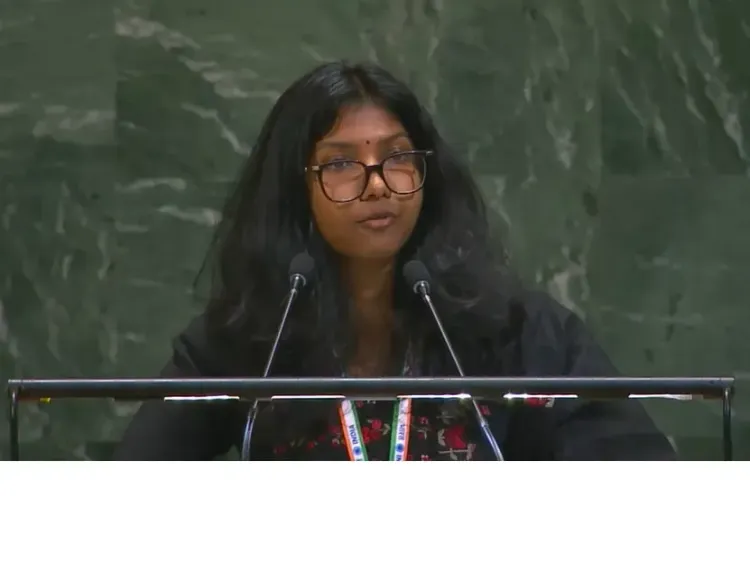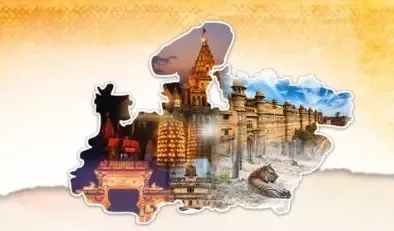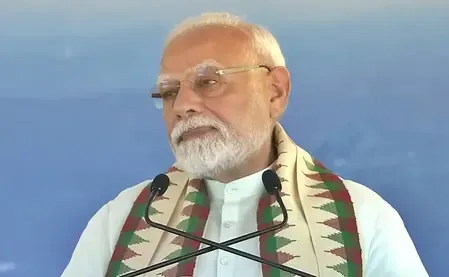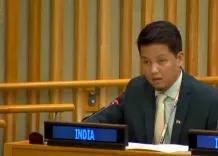Why is India Demanding Pakistan to End Human Rights Abuses in Kashmir?

Synopsis
Key Takeaways
- India demands an end to human rights abuses by Pakistan in Kashmir.
- Pakistan's military actions are viewed as oppressive.
- India emphasizes its commitment to human rights and democracy.
- The participation of Kashmiris in elections is seen as validation of India's democratic processes.
- Pakistan is criticized for its contradictory diplomatic statements.
United Nations, Nov 1 (NationPress) In a decisive communication to Pakistan highlighting its hypocrisy, India has insisted that it cease the serious human rights violations as its military quashes the people's uprising in regions of Kashmir that it unlawfully occupies.
“In recent weeks, the occupying Pakistani forces and their affiliates have taken the lives of numerous innocent civilians who are demanding their fundamental rights and liberties” in the areas of Kashmir they control,” stated Bhavika Managalanandan, a First Secretary at India’s UN Mission, on Friday.
“We urge Pakistan to halt the severe and persistent human rights infringements in the regions it occupies illegally, where the populace is in open defiance against Pakistan's military domination, oppression, brutality, and unlawful exploitation of resources,” she articulated at the General Assembly, dismissing Islamabad’s accusations.
Pointing out the tendency of Pakistani diplomats to hurl unfounded accusations against India at every opportunity during UN discussions, Managalanandan remarked, “Repetitive allegations and falsehoods alter neither the reality nor the truth.”
“Pakistan's contradictory statements and hypocrisy do not merit the attention of this esteemed forum,” she asserted.
Managalanandan referenced the participation of the people of Kashmir in elections as a testament to India’s democratic principles.
“We reject Pakistan's attempts to malign the people of India and their democratic choices, including those made by the residents of Jammu and Kashmir,” she stated, adding that “the social and economic advancements witnessed by them are clear for everyone to observe.”
She further remarked, “It is regrettable that Pakistan has chosen to undermine the principle of self-determination by making false equivalencies.”
While Pakistan frequently asserts that the Security Council mandated a plebiscite in Kashmir, the reality is that the Council’s Resolution 47 of April 1948 instructed Pakistan to withdraw its military and citizens from all of Kashmir.
Yet, Islamabad continues its illegal occupation, defying the Council's demand.
“I want to reiterate that the union territories of Jammu, Kashmir, and Ladakh are an essential and inseparable part of India,” emphasized Managalanandan.
Reaffirming India’s dedication to human rights, she stated that it “originates from our freedom struggle led by Mahatma Gandhi, which stressed non-violence and equality.”
The Gandhian ethos is embedded in the Constitution, and “India's domestic framework for human rights protection is continually evolving and strengthening,” she noted, highlighting that India has implemented progressive legislation and initiatives to protect fundamental rights.
The judiciary has broadened human rights protections, while the National and State Human Rights Commissions provide a robust framework for rights safeguarding, she concluded.








